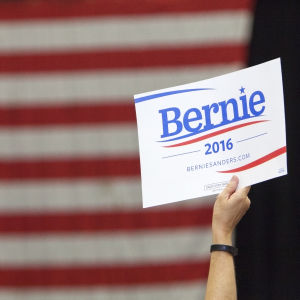If you accept that seminal means an event or moment after which things will never be the same again, then we are living through a seminal year.
In matters big and small, change is in the wind.
This wind blew through Iowa and New Hampshire, and is defining the 2016 presidential election. Donald Trump and Bernie Sanders are not so much the leaders of this time of change, but rather the products.
The product is something hard to pin down, but it is there nonetheless — a sense that it is time to turn the page, to read the next chapter; a yearning for something fresh.
The millennials, hunched over their cell phones, are looking for the future in their small screens. The rest of us are looking for it in new leaders; new lifestyles; and new thinking, sometimes about old ideas.
Societies go through periods when they feel the need to change up things. But they want a sped-up evolution rather than a full-fledged revolution. This is such a time.
Change is everywhere, from the bold, new things television is doing — frontal nudity, gay coupling and interracial love — to the kind of car we favor.
While we grapple with change and yearn for the new, we are surprisingly open-minded. U.S. values appear to be undergoing a recalibration: We are getting more socially tolerant. Social conservatives are a diminished force.
Young people do not have the same commitment their parents had to conventional employment, to be defined by where they work. This leads to a world where people are less concerned with appearances, and all that goes with appearances. The business suit and its essential accoutrement, the necktie, are on the way out — and in much of the country, they are now curiously out of date. Apartments are being favored over houses because of new social values.
My generation experienced the hopeful 1940s (just the tail end), the smug 1950s, the turbulent 1960s, the oil-shocked 1970s; and the computer-excited 1980s, which continued unabated until the dot-com bubble burst at the turn of the century — but re-inflated with new developments in Internet products like Facebook, Twitter and YouTube.
In recent times, the only new U.S. billionaire outside of the Internet was Hamdi Ulukaya, who popularized Greek yogurt in a country hungry for yogurt choices. That is a dumbfounding fact. It means that it will be harder to get investment in old-line businesses and startups. The smart money has become myopically obsessed with the cyberworld.
If you were to go to Wall Street today to raise money for a new nuclear reactor that put all doubts of the past to rest and offered income for 100 years — there are such machines on the drawing board — you would find it hard to raise money; easier for a new Internet messaging system. This when there is no shortage of Internet messages (too many, I cry each morning). We are leery of the hard and enamored of the soft.
We sense that the education system is not doing its job; that it is broken and needs fixing but how, we are not sure. We are sure, though, that we are going to change it.
We sense that we had the dynamic wrong in foreign affairs. That change at home, like toppling generation of political leadership, is desirable, while toppling leaders abroad is a fraught undertaking, as with Saddam Hussein, Moammar Gadhafi, Bashar al-Assad.
We feel less good about the wealthy, and we are less sure that there are secure places for us in the future. We watch cooking shows and order in pizza. We gave up smoking and started jogging, but are, so to speak, deaf to the damage we are doing to our ears with incessant music piped to them by earbuds.
We are more nationalistic and less confident at the same time. We treasure our values more, and wonder about their long-term durability.
The largest contradiction that can easily be inspected is in the themes of Trump and Sanders: Trump has rehabilitated a kind of racism aimed at immigrants, while Sanders has made the taboo word “socialism” acceptable in political dialogue.
The desire for change has moved from a slight wish to a hard desire for a new alignment. It is everywhere, from what we eat to how we feel about the climate. But we do not agree on this new alignment, hence the huge gulf between Sanders followers and Trumps adherents.

